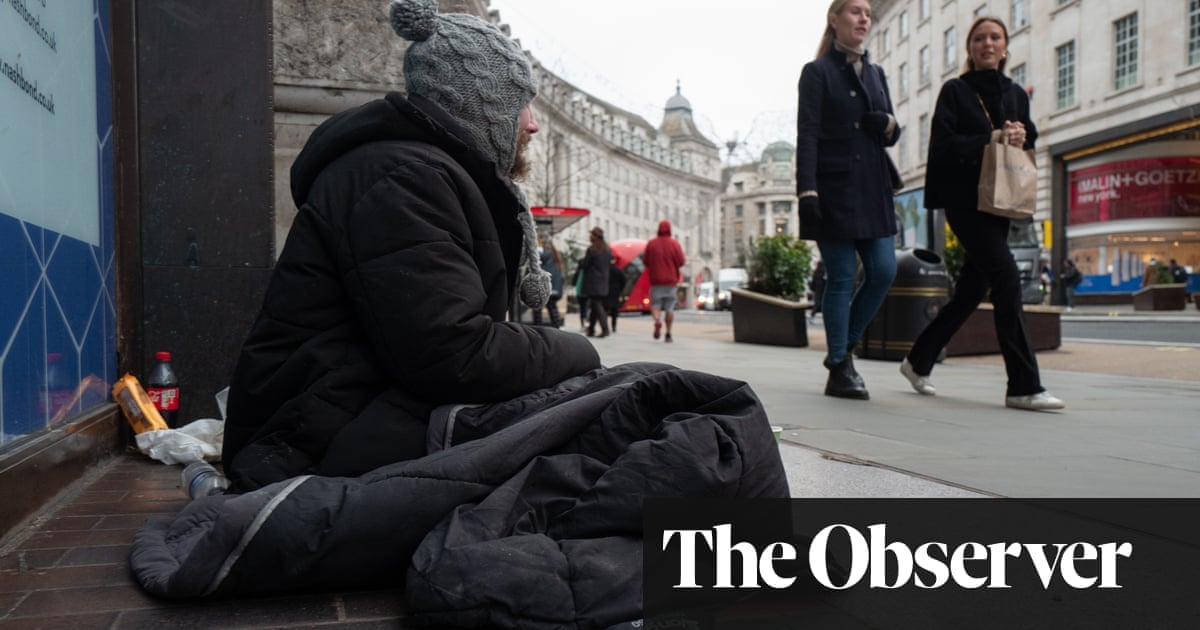- cross-posted to:
- [email protected]
- cross-posted to:
- [email protected]
The new study, funded by the government and carried out by King’s College London (KCL) and the homelessness charity Greater Change, will recruit 360 people in England and Wales. Half will continue to get help from frontline charities. The other half will get additional help from Greater Change, whose support workers will discuss their financial problems then pay for items such as rent deposits, outstanding debts, work equipment, white goods, furniture or new clothes. They do not make direct transfers to avoid benefits being stopped due to a cash influx.
Professor Michael Sanders, who runs KCL’s experimental government unit, said: “What we’re trying to understand is the boundary conditions for cash transfers. When does it work? For whom does it work? What are the amounts you need to give people in order to make it work?”
One of the first cash transfer schemes was in Mexico in 1997 and since then they have been used around the world. But most evidence is from low and middle-income countries, and there has been opposition from politicians and the public, who often believe people will spend the money unwisely. Last year researchers in Canada found that giving CA$7,500 (£4,285) to 50 homeless people in Vancouver was more effective than spending money housing them in shelters, and saved around CA$777 (£443) per person.
there has been opposition from politicians and the public, who often believe people will spend the money unwisely
Aye, there’s the rub: people disregarding evidence in favor of their beliefs unsupported by reality.
This has been tried multiple times across numerous jurisdictions. Consistently it’s been found that giving poor people money makes them less poor in the long run. This seems to be an unsavory result, however, so politicians let the experiment retire never to actually learn from the results and draft policy.
This experiment is going to work and then nothing will come of it only for another jurisdiction to try exactly the same thing again and find exactly the same results.
The myth of meritocracy is still too prevalent a belief.
George Carlin hit this on the head. If you don’t have the homeless there’s no one to scare the poor into working.
For the wealthy, It’s important to keep people one paycheck away from the street. If you pay people too much, they have options. When people have options, they don’t blindly obey. If people know they can’t ever hit the street, they will demand more from the rich to wipe their asses.
This is why slavery exists. As long as you put food in the trough, they are alive to serve.
who often believe people will spend the money unwisely
But if they spend that money “unwisely,” it’s fine. Sure, you can buy a $50 bottle of wine to get drunk with friends at dinner, but they get drunk on some cheap malt liquor because they’re fucking homeless and it sucks- or, heaven forbid, get addicted to opiates because they’re in pain and live in a country with a for-profit health care system- and they’re the problem.
Giving them cash is nice. Giving them homes would be nicer. If you house the homeless and also offer them addiction counseling and mental health care, most of them don’t end up back on the streets. Sure, some people will always be homeless, but most homeless people just need help to get out of that situation.
But money helps too. You can’t afford a phone or new clothes that don’t stink and look presentable? Or just basic toiletries? Good luck getting a job.
Also shelters don’t count and you cannot interpret refusal to stay at a shelter as “wanting to be homeless.”
I help out with a street outreach mutual aid group. I’ve not met a single person that wanted to be homeless but I’ve met tons of people that don’t want to fuck with shelters cause:
- they have to get rid of their dog
- they can’t bunk with their partner or children
- they are trans and most of the shelters are religiously affiliated
- there are tight curfews and early kick out times
- no guarantee of consecutive night stays or even a bed, no consistency
- you can’t have friends over
- you can’t have more than one bag
- you must walk outside to a separate communal bathroom–even in a blizzard–if a pee cup is discovered you’ll be kicked out
- you must attend religious services prior to receiving aid
- some shelters are day only
The streets are harsh, but in most cases the shelters are worse. Their only consistent benefit is that they are warm when it’s -20F out and if you keep your head down the police will probably not fuck with you.
Agreed 100% and the dog part is even more serious than people think because a lot of homeless women need their dog for protection. So their choice is then either temporary shelter and no protection once they’re back out on the streets or protection but no shelter.
Who knew that poverty, a condition created by lack of money, could be solved by simply giving people money?
Next up you’ll tell me they’ll give hungry people food.
Hungry people will only waste the food by eating it /s
(Almost) all poverty in western nations today is artificial; That means, poverty is intentionally created to keep people on their toes, because it is believed that makes them go to work. The economy needs workforce, after all.
When there’s a smaller demand for workers, I believe UBI support will go up. That is why I support AI.






